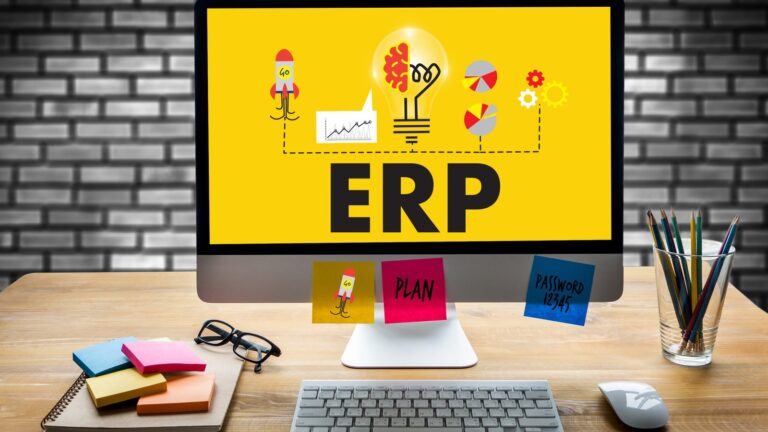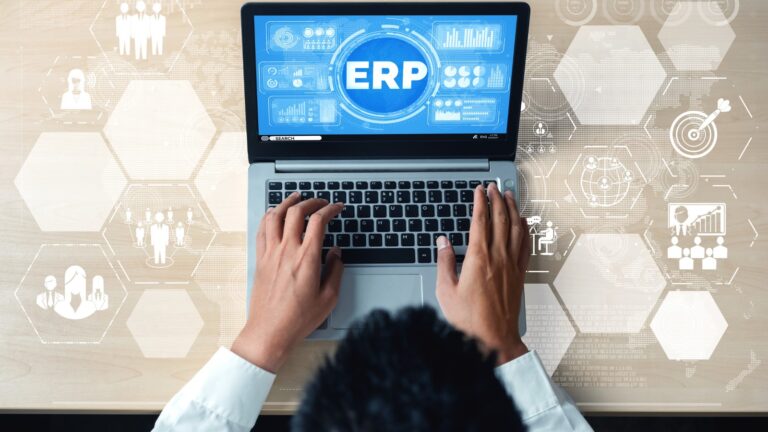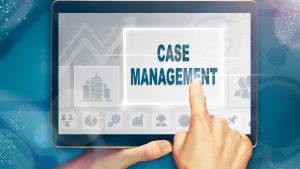Enterprise Resource Planning (ERP) is a popular software solution that is considered a vital tool in the business world. It primarily integrates an organisation’s business processes and applications into one common platform. Due to this, ERP is seen as a cost-effective mode to digitalise operations, allowing managers to keep track of everything in their organisation through one digital screen.
The number of ways an ERP system can help a company’s growth is multiple, from accounting to project management, risk management, customer relationship management, and more. Over the years, while many employees have widely adopted ERP, certain myths or misconceptions of ERP solutions have resulted in others not adopting it. This blog will disregard the popular myths of ERP solutions, demonstrating that they should not be considered a substantial reason not to integrate an ERP solution into your business operations.

Six Myths of ERP Solutions

The global ERP market is set to reach USD 74.2 billion by the end of 2023, with critical players recognising its essential role in their company’s success. Here are six of the most common myths about ERP solutions being proved wrong.
ERP is Not Suitable for SMEs
Many believe ERPs are unsuitable for SMEs as a company would only have limited processes. While traditionally, ERPs were associated exclusively with large firms, today, businesses, regardless of their size, have found an ERP to be beneficial. This is because an ERP allows such companies to scale easily and add multiple customisations according to their liking, making it a key resourceful tool that is sustainable in the long term. While the expense of an ERP is often quoted as a reason why it is not for SMEs, a company that does make a smart move to invest in the software in the get-go, especially if they are taking on an ambitious load of work, can optimise their workload and time by digitalising mundane tasks and ensuring every staff member is engaged in more serious roles.
Only Top Management Can Use It
Everyone Implements the Same ERP
It is essential to understand that an ERP solution is not a one size fit for all. Instead, depending on your company type and the operations undertaken, organisations should invest in an ERP that suits their needs and requirements. Hence, companies must first identify their problems and whether an ERP solution can address them. Thus, businesses can purchase a solution that complements the requirements, functionalities and features most suited for their operations. This is also where it becomes extremely important for companies to conduct thorough research before investing in a potential vendor. Whether they can customise the ERP solution to your needs is a great way to ascertain what kind of ERP solution is the most effective and whether it has a high probability of ensuring you receive your ROI.
ERP is the Same as SCM and CRM
It is a common mistake to consider Supply Chain Management (SCM) and Customer Relationship Management (CRM) as the same solution. While each may be compatible at a certain level, especially in terms of recording details in a digital system, thereby providing more reliable information, they have their own functions. A CRM, for instance, is exclusive to managing and maintaining cordial relations with customers. On the other hand, an ERP looks at the overall business picture instead of focusing on one function that can help the organisation. The great thing about an ERP system is that it can be integrated with other solutions that a company has invested in. If, however, if the company has not, an ERP offers modules that help with customer or supply chain management, you do not need to purchase a separate solution.
It is Only An Organising Tool
Some consider ERPs to be nothing more than a tool that assists one with administrative tasks. While this is true, in reality, the ways in which an ERP solution can benefit a company extend beyond administrative functions. For instance, modern ERP solutions embedded with data analytics capabilities can provide valuable insights that can help you maximise profits and make smart decisions. Hence, businesses can now stay ahead of market trends and consumer trends, which the ERP system will automatically assess and communicate to the manager. In effect, companies can make power movements in their respective industry, ensuring they directly cater to the consumer’s demands and are constantly on their toes to deliver what is most needed. This means the fluctuating and volatile nature of the business world can be tackled with a futuristic ERP solution.
There Are Only On-Premise ERP Solutions
Some believe ERP is relatively too old for a solution to invest in, considering the number of advanced solutions in the market today. However, over the years, ERP systems have evolved, offering consumers multiple options from on-premise to cloud systems. This allows consumers to decide which infrastructure they prefer their ERP systems to have instead of forcing a company to transition to a cloud infrastructure. Interestingly, a significant number of businesses are still using on-premise software for personal reasons, with security being a concern. Hence, whether you want to invest in an on-premise or cloud ERP solution, you can unlock multiple benefits. Whatever you decide to choose, security can only be guaranteed through the vendor. Hence, finding the right partner with the required experience, expertise, and certifications that prove its reliability is pivotal.
Do Not Believe The False Narratives of an ERP Solution

Rather than believing everything you hear about an ERP solution, it is best to conduct your own research and talk to industry experts or companies that have implemented such a system. With the number of ways an ERP solution can help a company progress into the future, opting out of such a solution could be a waste. However, an ERP system must be updated and maintained properly to function well in the long term. These factors must be considered when dealing with what kind of ERP system you should purchase. Also, keep in mind that it takes some time for the benefits of an ERP system to be experienced. Hence, implementation is a key phase which may take time. Nevertheless, everything becomes smoother once you integrate it into your business operations.





